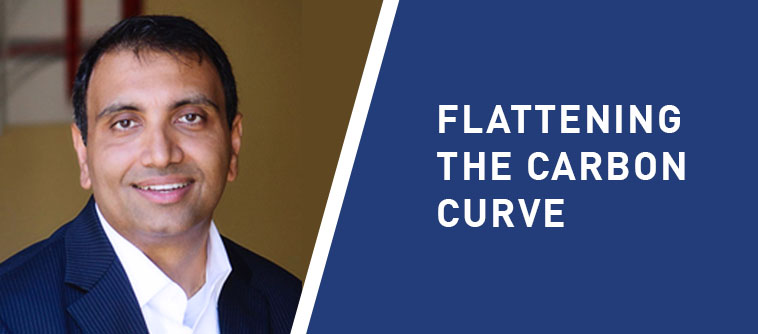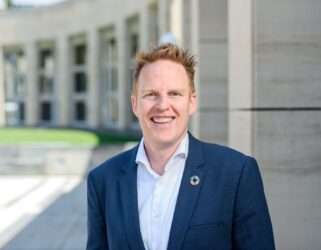
“How do we create a global brand campaign that says that the house is on fire to project a sense of urgency?” This was one of the thought-provoking questions that Nijhawan threw to his 150-strong audience at a webinar organized by the IMD alumni association of Silicon Valley and North America.
He spoke of a three-pronged attack involving decarbonization technologies, entrepreneurship, and better individual choices.
“We have 20 years to reach the net-zero carbon emission goal to save our planet,” he said, adding, “the biggest issue I have is that it doesn’t feel like a crisis to any of us.”
“We do not recognize that we are the boiling frog in this crisis, and there are no emergency exits.”
There are both formidable challenges and opportunities attached to the work of flattening the escalating carbon emissions curve.
Since completing his MBA at IMD in 2004, Nijhawan has been working at the cross-section of entrepreneurship and venture investments, as it relates to decarbonization. The subject of decarbonization is complicated, and for some, still controversial. Yet, Nijhawan made it easy to grasp and gave a call to action to all of us.
“We need to turn to technology to reverse climate change,” and in doing so, keep in mind that “whatever we have been doing for the last 150 years, we need to clean up in the next 20,” he said.
Paths to a decarbonized world
Humanity faces a monumental existential task as we seek to reverse climate change. According to the UN’s Intergovernmental Panel on Climate Change (IPCC), we should aim to cut an equivalent of 50 gigatons of greenhouse gas emissions per year by 2040 to avoid global temperature increase of 1.5-degrees Celsius, relative to the pre-industrial era.
We need to dramatically reduce the cost of decarbonization to sub-$100/ton of carbon dioxide to achieve this goal, Nijhawan explained, and the evidence from the COVID-19 lockdown suggests that we cannot realistically achieve this goal by slowing down the global economic activity.
Nijhawan noted that shifting the energy mix to price-competitive renewables paired with a variety of storage technologies, such as pumped-hydro and batteries, has the most significant decarbonization impact. Beyond intra-day energy shifting, we need to seasonally shift the excess renewable energy to hydrogen as an energy carrier and fuel.
“Renewable hydrogen is an important solution on the horizon to decarbonize many industrial sectors of our economy,” said Nijhawan, who founded his latest venture ElectraSteel in May this year. Backed by leading sustainability-focused venture capital investors, it seeks to electrify and decarbonize steelmaking (a trillion-dollar market) using renewable energy to help eliminate 5% of global carbon dioxide emissions per year.
Entrepreneurial opportunity and the constraints
Daunting as the decarbonization task is, we’ll need many entrepreneurs with Elon Musk-type vision to get the ball rolling, said Nijhawan.
The market opportunity is enormous: over trillion-dollars per year and 10 billion consumers. The risk-reward profile suits an entrepreneur to lead disruptive transformations more than incumbents. The entrepreneurs also have access to increasing (public and private sector) capital funds available to fight climate change.
“However, we are constrained by a lack of entrepreneurial talent that has the passion for making a big impact, experience in commercialization of technologies from lab to market, building bankable teams, and an ability to raise a significant amount of patient investor capital with more than a 10-year horizon,” stated Nijhawan.
Beyond, an entrepreneurial talent gap, he said that we are constrained by a lack of global industrial policy and coordination across all levels of today’s geopolitical landscape on this issue.
“It has taken us 20 years to get to the point that renewables are the cheapest source of energy generation. We need to transform multiple sectors in the next 20 years, so we need a policy that cuts across industries and geography,” according to Nijhawan.
The industrial policy introduced by Germany in 2000, which was subsequently adopted by California and 50 countries eventually, was instrumental in developing the market mechanism to deploy renewables. According to Nijhawan, price on carbon (or a tax) is one such policy mechanism that can be used across many parts of our economy and globally to help move toward the goal of the carbon-less world economy.
Imposing “climate solutions that help create local jobs and make more of us part of the solution” is also essential.
We have a huge moral responsibility in educating ourselves and helping prepare the next generation to fight this crisis, he explained.
Business and government have an outsized role in fighting the climate crisis, but that does not absolve us from our collective responsibility, said Nijhawan.
“We should not underestimate the opportunity for all of us to make behavioral changes that can help flatten the carbon curve,” he added.
What we decide to consume, whether we choose to buy an electric car or not, what energy sources we consume, which policies and leaders we support, Nijhawan reminded us, sends a powerful signal to the market.

